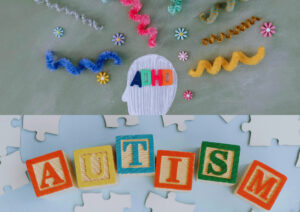Neurodiversity 7 of 7: Myths & misconceptions about neurodivergents

Because research about neurodiversity has traditionally been done by neurotypical scientists, without asking the actual neurodivergents how they are feeling (as is the case for most things that are classified as “mental health disorders”), there are so many misconceptions in the public opinion of these concepts. Thankfully, more adult neurodivergents who are able to communicate are speaking out, and more and more misconceptions are being cleared up. Here are a few of the most notorious ones.
1. “Only kids can be autistic/ADHD”A neurodivergent brain is not something you can outgrow. Some people may feel this way because they learnt better ways to mask their symptoms, but this is not synonymous with coping well and thriving. Many neurodivergent adults nowadays struggle more than kids because there is less acceptance and support for them.
2. “ADHD’ers will never be able to focus properly”ADHD’ers don’t have a problem with focus, they have a problem focusing on things they are not interested in, and maintaining their attention in a world that is built by people with low sensitivity who have no idea how many details a neurodivergent person can pick up, or what their sensory systems need in order to focus properly on their work. ADHD’ers can learn ways to cope within these environments, and all brains have the capacity to learn and change their patterns. Struggling to focus on uninteresting subjects is a feature of monotropism, which is a theory underlying why neurodivergent brains are the way they are. To learn more about this, see the Neurodivergent Life resource pack (under Resources).
3. “ASD & ADHD are less likely in girls and women”Currently, neurodivergent girls and women are severely underdiagnosed, and the misconception that females are less likely to be neurodivergent causes huge amounts of harm, for example misdiagnosing a neurodivergent woman with several other mental health diagnoses without even considering neurodivergence. Neurodivergent girls and boys present differently and are affected differently by the specific kinds of trauma neurodivergents face growing up. Girls are often much better at masking than boys, and are much more likely to learn neurotypical habits and communication styles. Up until very recently, neuroscience has done most research on male brains, and our definitions of what neurotypical and neurodivergent brains looks like may be based on hugely male-biased presentations.
4. “Autistics are bad at communicating and socializing”Studies have found that autistics communicate really well with other neurodivergents. There are only miscommunications between neurodivergents and neurotypicals. Why is this? Perhaps this is less a deficit in neurodivergent brains, but simply because of different communication styles. Neurodivergents prefer very direct and clear communication. The neurotypical habits of hiding their true intentions, suppressing their emotions and manufacturing paradoxical body language in order to appear a certain way confuses the hell out of neurodivergents, because they tend to use very direct ways of expressing their thoughts and feelings and their body language is very clear. Unless of course trauma has them hiding themselves or they’re masking themselves in order to appear more neurotypical. All in all, getting neurotypicals and neurodivergents to understand one other is a mess, and needs a lot of explaining, which usually falls on the neurodivergent’s shoulders because they are still seen as the ones who are “bad at it”.
5. Autistics lack empathyNeurodivergents have highly developed sensory systems, which means they have much deeper capacities to feel emotions, including others’ emotions in their own bodies. But because of trauma and masking, they can find it extremely difficult to access and identify what they’re feeling and express that authentically. Trauma creates dysfunction in the cranial nerves in the head and face, which are directly responsible for expressing emotion through the face and for helping us read others’ facial expressions. When a person does not mirror your facial expression while you are speaking to them (because of cranial nerves not functioning well), you’ll assume they don’t understand you or cannot empathize with you. But this is an assumption only: most neurodivergents have much more empathy than neurotypicals, but do not express it in the same ways.
6. “If you’re good in school/at work, you cannot be autistic/ADHD”Being neurodivergent does not mean you are necessarily intellectually impaired. It also does not mean that you are necessarily a genius. There is as normal a variety in intellectual capacity among neurodivergents as there is in neurotypicals. Categorizing people in terms of ‘intelligence’ is outdated anyway, since there is so much variety in cognitive function among people. And being “good at school or work” is dependant on so much more than just intelligence.
7. “All neurodivergents are disabled and can never live normal lives”It is time that we separate the idea of disability from the concept of neurodivergence. There are many differences in brain and social function that make it impossible for neurodivergents to live like neurotypicals, but that should not be our standard for what a ‘normal’ or ‘healthy’ lifestyle is. We all have different ways of living, and should allow ourselves and each other so much more freedom to live uniquely, just as unique as we are at our core.
It can be immensely liberating to understand that your brain might be different, and to separate yourself from mainstream categories and stereotypes. In essence, all humans are naturally diverse, and I believe the neurodivergent neurotype represents one of the more interesting ones, and we are continuing to learn more and more about it.
I am still learning about myself every day, but there is so much that this understanding has already given me. I have learnt to take care of my sensory needs, I have learnt to build a lifestyle around my unique energy levels and what is needed for my brain to be creative and productive, and I have learnt what my nervous system needs in order to regulate itself. All this has helped me live a life that is much more peaceful and balanced than ever before, and there is still so much room for improvement. Most importantly, I have found the words to describe my experience, and I have found connections with other neurodivergents that have helped me feel more supported and loved. My neurodivergent friends and family continue to teach me so much, and being seen for who I truly am has done a lot more for healing my trauma than I ever could have done for myself. If there is one think I’d like a neurodivergent person to realize, it’s this: It is OK not to fit into other people’s boxes. Don’t try. Those boxes are not for you. Make your own boxes, or throw away the boxes and let yourself be free. Have fun and be yourself; you are allowed to.
If any of this feels familiar to you, I encourage you to do more of your own research. When it comes to neurodiversity, it’s not about labeling yourself – it’s about understanding yourself. The resources below can help you get started.
One small word of caution: never label anyone else. Never tell your spouse/friend/brother/mother “I think you might be autistic”. It will not go down well. Allow people to discover themselves in their own time. Their neurodivergent brain is theirs, and theirs alone.
I put together a resource pack for neurodivergents to help them on their journey of self-discovery. If you are neurodivergent, or think you might be, or even if you’d simply like to learn more about it, download your free copy here: Neurodivergent Life: Simple Tools & Resources to Guide You Down the Rabbit Hole.
I also started a WhatsApp support group for neurodivergents since the public talks I gave, and this group has been a valuable space for sharing tools and helping each other understand and cope. Find the invite link here:
If you think you may be neurodivergent, take this online quiz to find out if you may have some neurodivergent traits: Neurodivergent traits Questionnaire NTQ (link button). This questionnaire is for self-understanding purposes only and does NOT serve as a diagnosis.
- Share:
You may also like




